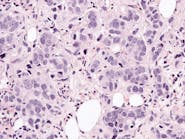A new targeted drug, studied by researchers at The Ohio State University Comprehensive Cancer Center – Arthur G. James Cancer Hospital and Richard J. Solove Research Institute (OSUCCC – James), may offer a new treatment option for patients with blood cancers, including chronic lymphocytic leukemia (CLL) and Non-Hodgkin lymphoma (NHL) whose disease has stopped responding to standard treatments.
In the first clinical trial of this drug in humans, nemtabrutinib (pronounced Nem-ta-BROO-ti-nib) was effective in three-fourths of cancer patients tested, without severe side effects. The results of the trial were published in the journal Cancer Discovery.
Hematologist and study lead investigator Jennifer Woyach, MD, notes that about half a dozen drugs are available to treat these B-cell cancers. Although most patients respond to these drugs initially, over time, many patients experience disease progression.
The researchers tested the new drug on 47 patients who have had at least two prior therapies for their blood cancer. Over half of these patients had relapsed CLL, while the others had NHL. The researchers gave these patients one pill of nemtabrutinib every day, with different doses along the trial. They observed the patients’ response to the drug over time and monitored them for side effects.
The study found more than 75% of the patients with relapsed CLL responded to the drug, at an optimal dose of 65mg. These included patients who had mutations in BTK. Most patients remained cancer free for at least 16 months during the trial. While all patients experienced some side effects—which is common with chemotherapeutic drugs—many of these were minor and manageable, proving that the drug was also very safe.





